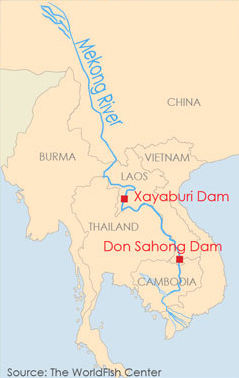Interview with Brian Eyler
Friday, August 12, 2016
Listen to the full interview between Dan Southerland (L) and Ian Baird (R)
As experts increasingly doubt the value of building large dams, Dr. Ian Baird takes a firm stand against international organizations that, according to him, have failed to mitigate the negative impact of these dams on local populations.
"It's not enough to have income going to central governments," he says in an interview with Dan Southerland, RFA executive editor. "You need to be more concerned about people being impacted by these projects."
 Map of two important dams in Laos
Baird points to the Nam Theun II dam in Laos, a project financed by
the World Bank that was supposed to be a model. In fact, he says,
recent studies show local people suffering from major floods,
destruction of their rice paddies, and resettlements that are poorly
compensated. "Local people's livelihood has gone downhill," he says.
"This is something the World Bank needs to take responsibility for
and do something about."
Map of two important dams in Laos
Baird points to the Nam Theun II dam in Laos, a project financed by
the World Bank that was supposed to be a model. In fact, he says,
recent studies show local people suffering from major floods,
destruction of their rice paddies, and resettlements that are poorly
compensated. "Local people's livelihood has gone downhill," he says.
"This is something the World Bank needs to take responsibility for
and do something about."
Baird also faults the Mekong River Commission, which he says has "no teeth."
"There's no way for local communities to express their concerns, people feel very disempowered," he says, adding that the lack of meaningful impact is driving donors away.
Baird is a professor of geography at the University of Wisconsin in Madison. He is currently based in Southeast Asia, doing research in Thailand, Cambodia, and Laos.
He is an expert on hydropower and its impact on local ecosystems, particularly on fisheries. He is a prolific author of many peer-reviewed articles on upland-lowland relations in Southeast Asian area large-scale land concessions, and on much more.
“There's no way for local communities to express their concerns, people feel very disempowered.”
In his view, not all is hopeless when it comes to the potential for development in the region. Taking note of the U. S. interest in defending the health of the Mekong Delta in Vietnam, Baird notes the positive impact of U.S. Secretary of State John Kerry's remarks at the last Lower Mekong Initiative gathering in July 2016.
It will take more than words and meetings to preserve an already endangered river system in Southeast Asia. Nevertheless, Baird finds solace in the rapid development and lower cost of solar energy. "Solar energy is one of the bright points in the Mekong region," he says. "We may see that a lot of these dams become redundant." He warns that if the many dams planned today are built, the ecosystem might be damaged for good, while people say, "We didn't need to build these dams."